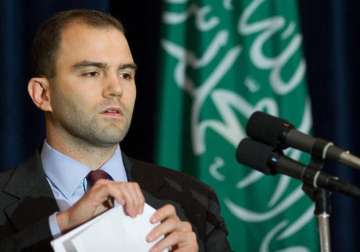PANAMA CITY: The White House pushed back Friday against declarations from Iran's leaders that any nuclear deal must include an immediate lifting of sanctions, indicating President Barack Obama will walk away from negotiations unless sanctions are removed over time.
Obama foreign policy adviser Ben Rhodes portrayed the tough stance by Iran's Supreme Leader Ayatollah Ali Khamenei and President Hassan Rouhani as a reflection of internal political pressure and not as an impediment to a deal. But Rhodes pointed out the framework agreement that Iran and the six powers reached last week to curb Tehran's nuclear activities allows for sanctions to be removed over time, not at once.
"It's very clear and understood that sanctions relief will be phased," Rhodes told reporters traveling with Obama in Panama for the Summit of the Americas. "The fact of the matter is, we have framework. The president has said if the details don't bear out, we won't have a deal."
In his first comments on the framework, Khamenei told a gathering of religious poets on Thursday that he "is neither for nor against" it. But he said the punitive "sanctions should be lifted completely, on the very day of the deal." He said because the agreement was only the framework and not the accord itself, "nothing has been done yet."
Rouhani, a relative moderate, sent the same message during a ceremony Thursday marking Iran's nuclear technology day, which celebrates the country's atomic achievements.
"We will not sign any agreement unless all economic sanctions are totally lifted on the first day of the implementation of the deal," Rouhani said.
Rhodes said Khamenei and Rouhani had to deal with internal politics, but that their statements should not be taken as a test of what the final deal will look like. The deadline for a final agreement is June 30.
"They have their own hardliners who are skeptical of this deal," Rhodes said. "The test of whether or not that framework can be memorialized is not a comment on any given day by an Iranian leader. The test will be if by the end of June we have a document."
But Sen. John McCain, the chairman of the Senate Armed Services Committee said in a statement Thursday that Khamenei's remarks "would appear to be a major setback" and said they suggest that that Iran and the Obama administration "are on very different pages."
"These differences need to be thoroughly explained by the administration if we are to give serious consideration to this agreement," he said.
White House press secretary Josh Earnest pointedly countered McCain in a Tweet Friday: "Naive and reckless for (at)SenJohnMcCain to believe every word of the Supreme Leader's political speech. He shouldn't."
The framework says sanctions put in place over Iran's nuclear program will be suspended once international monitors verify that Tehran is abiding by the limitations spelled out in the agreement. Rhodes said the International Atomic Energy Agency will have to inspect military sites.
An essential part of the deal, he said, is "having the IAEA ability to inspect suspicious sites, no matter where they are."
The West has long feared Iran's nuclear program could allow it to build an atomic bomb and that Tehran has used uranium enrichment -- the key point of contention in the negotiations -- to pursue nuclear weapons. Iran denies the charge, saying its nuclear program is for peaceful purposes only, such as power generation and cancer treatment.
Latest World News
